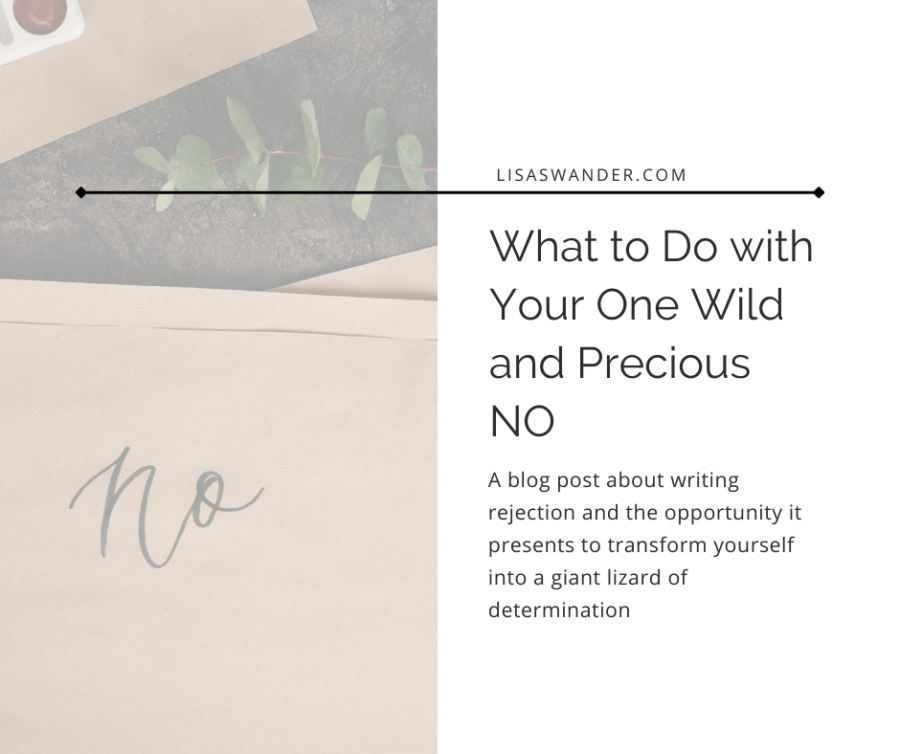This week, five separate agents and editors rejected my writing in the space of about 36 hours. Three of them were my last and best novel prospects—the agents I’d met at Agent Fest, the ones who liked my pitch, the ones I absolutely knew for certain were going to read my sample chapters—and the other two were reading satire pieces I submitted to cheer myself up after my last round of rejections.
And they all said no thanks. Good writing, but no thanks.
Among other things, including when it might be time to pivot to an audition for America’s Test Kitchens, this has left me wondering what I will do with this one wild and precious battery of NO.
I mean, okay, it’s not really the ONE battery of no—many, many more NOs will be volleyed at my inbox for as long as I stick with this writing thing. That’s all I can really know for sure. Death and taxes and writing rejection. Any writer could probably change her email alert to the Nelson Muntz laugh without moving the ball too much, before or after a successful book deal.
But this bout of rejection did have a singular feel to it. Usually I’ll go months without hearing anything from anyone—and most agents never respond at all—but weirdly, these five arrived in such rapid staccato fire that I couldn’t help but be suspicious of who was pulling the trigger.
It was enough that, after the fifth rejection, I closed my laptop, raised my eyes to the ceiling, and held up my hand. “Dude,” I said, more or less in prayer. “I got it.”
In the midst of what is, at its core, an embarrassing situation—you all know I wanted to find an agent, and it plumbs the depths of the human ego to admit you tried really hard at a battle you lost—I did remember something I heard about creative rejection once.
The podcast escapes me (although odds are high that either Elizabeth Gilbert or Pete Holmes was involved), but the host was a writer. This writer told a friend, or maybe a guru, that they’d gotten one of those big, fat, mackerel-to-the-face NOs just like I did. And the friend said, “Oh, exciting. What are you going to do with it?”
It was such a lovely, revolutionary thought that I tucked it away in my brain for the great NO onslaught of 2022, apparently. What am I going to do with it, indeed.
A NO has energy, this wise and possibly made-up friend was saying. You have no choice about that; it’s impossible for the thing to coast into your life in neutral. A rejection is always going to be a frizzling ball of agitated neutrons. What you get to choose is how that energy will be directed onto the remains of your tortured soul.
And you do have options.
You could certainly use it to flatten you into crisp slice of writerly roadkill. This was my first thought and also the default application of NO energy, I believe. You simply stand still and wait for the NO to squish all the creative guts out of your life, and then you go get a job as an inspector of very thin hallways and never write another word as long as you live.
Or you could use your NO to warm a quilted blanket under which you nestle your creativity. There it can enjoy a decade or two of sleep, peaceful and utterly squandered, while the rest of your mind stays up until 2:00 AM watching videos of David Tennant accepting lifetime achievement awards.
Or there’s a third option. A divergent option. An option best illustrated by 2014’s cinematic opus Godzilla, which I have recreated here with Trogdor because Godzilla is hard to draw.
You let the energy of the NO feed you, like the good Titan himself growing with each hit from the free world’s nuclear arsenal.
After much consideration, depression, and time spent with Ewan McGregor’s iTunes catalog, I’ve decided this is the option for me. I’m going to let the NOs irradiate me into a fiction-writing leviathan, a process christened by me opening the draft of my next book and shuffling some paragraphs around.
By the weekend I hope to be capable of destroying most major cities.
I’ve also decided to look at the writing, editing, and querying of my first novel as an extended (and unpaid) internship in how to be an author. I mean, what’s a couple of years, in the grand scheme of things? If I need to log those 10,000 hours of practice anyway, how better to do it than by really, earnestly trying? Even if admitting that I was trying is sort of the worst?
It’s not the worst. Not really. Especially not if it makes trying—openly, soft-heartedly trying—seem a little more possible for you, too. We can survive it. Not only will it not kill us, but it will also make us a formidable addition to any SimCity game, and if that’s not a measure of success, I don’t know what is.


